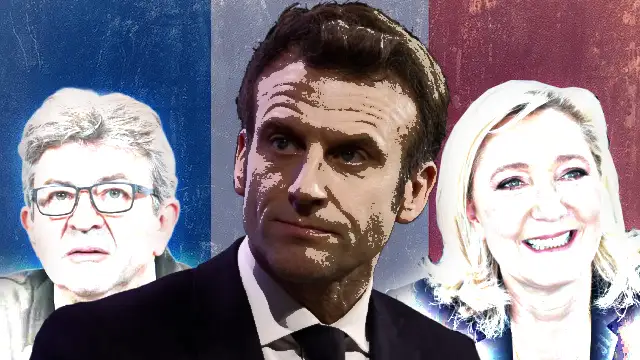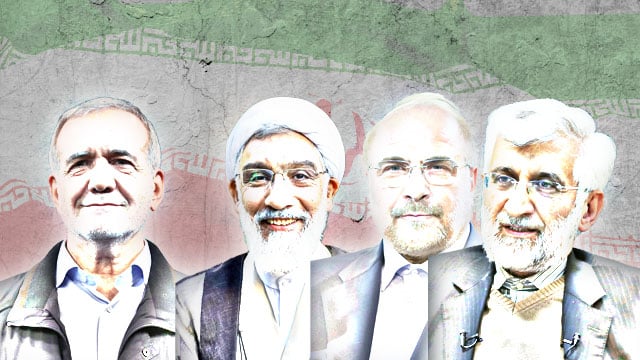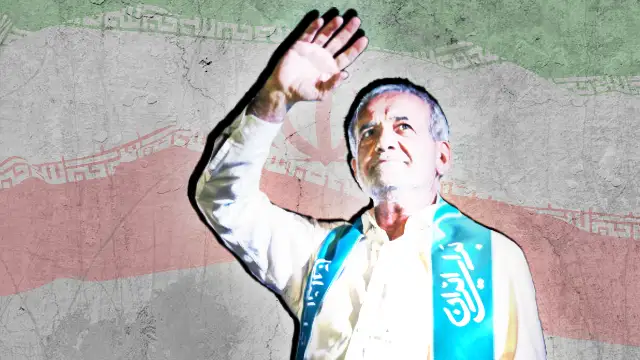In a surprising turn of events, the hastily-cobbled leftist New Popular Front (NFP) won the highest number of seats in the French National Assembly elections on Sunday, while President Emmanuel Macron’s centrist Ensemble Alliance became the runner-up, leaving Marine Le Pen’s far-right National Rally (RN) at the third position.
The NFP won 182 seats in the 577-seat French National Assembly. The centrists of Mr Macron’s Ensemble secured 168 seats, while the RN got 143 seats.
While no party could secure the absolute majority of 289 seats, France is gripped in political turmoil having Mr Macron to decide on the government. Earlier, he sought an alliance with the NFP after the first round of voting in which he was falling far behind.
Despite the newly and hastily formed coalition of the NFP and Ensemble to thwart Ms Le Pen’s RN, the far-right party has emerged to be the biggest opposition party by winning 143 seats in the French National Assembly elections, from its previous performance of 89 seats in 2022.
What made the RN elevate to become a better option for many French voters despite its history of antisemitic, xenophobic and racist ideologies? Has the far-right party ascended on its own or has President Macron played a role, unknowingly?
The RN’s rise in French National Assembly elections
The RN, which had a foundational antisemitic and xenophobic outlook during the time of Ms Le Pen’s father and the founder of the party, Jean-Marie Le Pen, softened its stance in recent years. Ms Le Pen expelled her father in 2015 distancing herself and her party from his relatively toxic stance and came out as an independent and more “nationalist” leader of the party. This move worked for her, as she has been attaining more and more votes ever since.
She came up strongly with the issue of “National Priority” which deals with matters of immigration. She has been vocal on the anti-immigration issue to ensure national security and sovereignty.
Her agenda has also been to enact the “National priority law” that includes open discrimination against immigrants in all spheres like housing, job hiring and other public benefits.
Ms Le Pen has been pushing to repeal laws that allow immigrants to become legal residents of the country and gain public benefits “as equals.” She has also been vocalising the idea of de-Islamisation of French society, as her father did, but in a less toxic and more appealing narrative.
She has been actively advocating for economic protection that involves free trade for French economic stability.
However, are these the only factors that have helped the RN to be seen as acceptable during the French National Assembly elections, unlike its earlier avatar under Mr Le Pen, or has President Macron unintentionally helped to normalise Ms Le Pen’s RN through his actions?
Macron’s unintentional help to RN
Mr Macron’s unpopular policies did not just erode his vote bank, they also helped Ms Le Pen’s party’s spiralling rise during the French National Assembly elections.
His failed policies including the pension reform and the gas tax, rising joblessness, stooping economic growth and rising international debt have all accounted for the declining support for Ensemble Alliance apart from the anti-incumbency caused due to his seven-year-long rule.
However, the rising support for the RN has also been connected to Mr Macron. A severe inclination of Mr Macron towards the right in recent years, on anti-immigration and de-Islamisation, has given Ms Le Pen an “ideological victory.”
Mr Macron passed the controversial immigration bill in December 2023 to win the approval of the far-right, which includes changes on residency and citizenship, despite protests from his party members.
As a shift towards the right, in 2023, Mr Macron’s cabinet also iterated the hijab ban in schools and universities for Muslims, who account for 9% of the total French population, as of 2018.
Over the years, especially following Russia’s special military operations in Ukraine, France’s growing involvement in the affairs of the North Atlantic Treaty Organization (NATO) has caused severe turbulence in the country.
While the far-left viewed this as a compromise of French sovereignty to aid American interests, the far-right saw this as an additional fiscal burden on Paris.
Ms Le Pen’s far-right RN opposes France’s involvement in Ukraine. Ms Le Pen had clarified earlier that her government would stop arming Ukraine with weapons that could strike inside Russia as it raises the risks for France.
Moreover, even though Ms Le Pen’s father had criticised Gaza as a concentration camp, she has been consistently supporting Israel’s aggression on Gaza. This support for Israel has helped Ms Le Pen win the support of the Zionist lobby.
Israeli Diaspora Affairs Minister Amichai Chikli threw his Likud party’s—led by Prime Minister Benjamin Netanyahu—support behind Ms Le Pen, calling her the best choice for Israel after the first round of French National Assembly elections.
Although Ms Le Pen was accused by the centrists and a section of the left of being funded by Moscow, the fact that Israel stood by her has been ignored.
What happens now?
While it has been expected that as the leader of the France Unbowed (LFI), a major constituent of the NFP that won 77 seats of its own, Jean Luc-Melenchon will become the prime minister, however, his hardliner approach and the reluctance of the centre-left Socialist Party to support him may create hiccups in the early days of the alliance.
So far Mr Macron has asked Prime Minister Gabriel Attal to hold on to his post, which is quite unusual after a defeat in the French National Assembly elections.
Critics allege that the other constituents of the NFP would look for support from Mr Macron’s centrist bloc and in return it will have a prime minister from the centrist Socialist Party.
In that case, the choice of the prime minister could be Raphaël Glucksmann, a member of the European Parliament.
Mr Glucksmann, the leader of the Socialist Party that has bagged 59 seats is known for his anti-Russia, anti-China, pro-NATO and pro-West leanings, and he appears to be the best bait against Mr Melenchon for Mr Macron and the western globalists.
That would create difficulties for the French left, now jubilant over the outstanding performance, as it would have to toe the centrist line and adopt neo-liberal agendas.
Moreover, despite Mr Melenchon’s towering presence, his left policies won’t be implemented in the long run.
Unlike the Popular Front of the 1930s, the current one in France is hastily stitched before the French National Assembly elections. The NFP neither has an ideological stance nor any common agenda.
While the Socialist Party remains a staunch supporter of NATO, the US-led world order and the war against Russia in Ukraine, the Communist Party and the LFI oppose them.
The NFP has no clear stand on Mr Macron’s pro-liberal economic policies, and with its victory credit due to Mr Macron’s withdrawal of 200 candidates before the second round of French National Assembly elections, it’s likely to remain loyal towards the Ensemble Alliance.
Also, figures like Glucksmann, who support NATO’s Ukraine operations, promote Sinophobia and peddle the neo-liberal narrative, are there in the NFP, making it less of the left that the working class needs and more of the coalition that the global elitists need.
What is evident to happen now is that the RN will continue to play the principal opposition’s role, which will help it capitalise on the discontent of the people against neo-liberal, pro-globalist policies and channelise them against the left to discredit them and wean away France’s powerful working class towards itself.
A journalist interested in national and international news. She aspires to highlight the common people's concerns through human interest stories and deep-dive articles on geopolitics.




